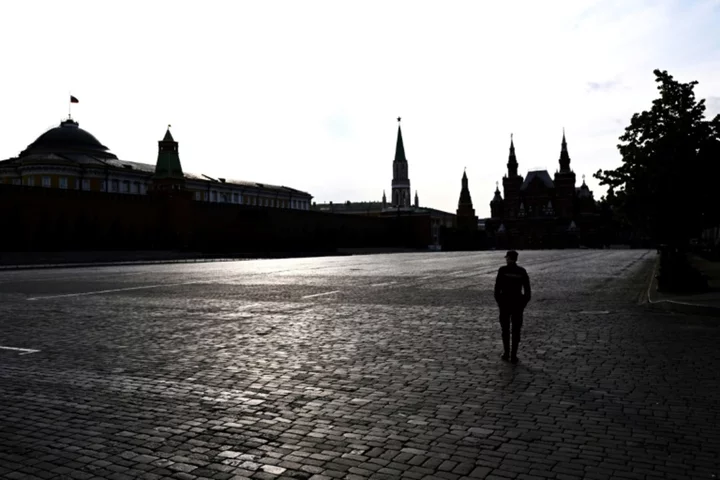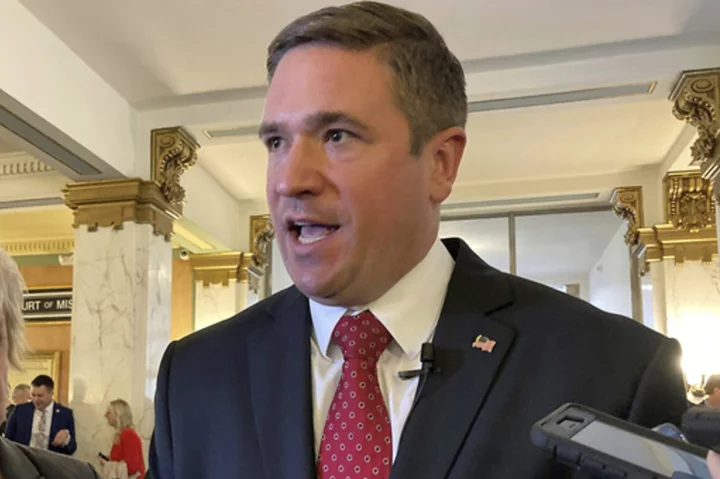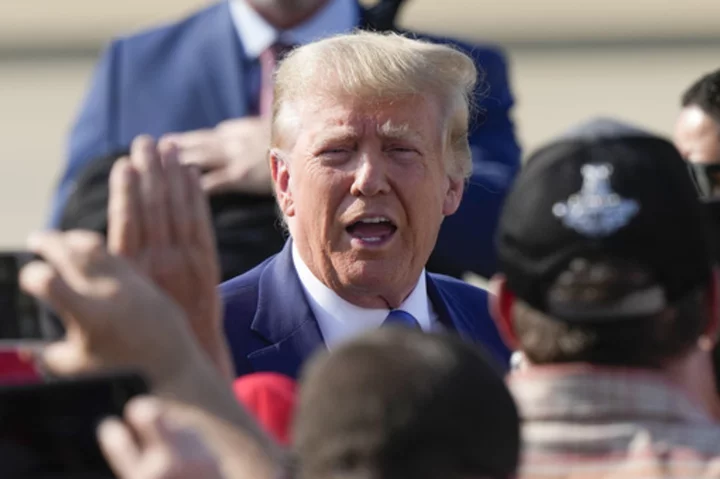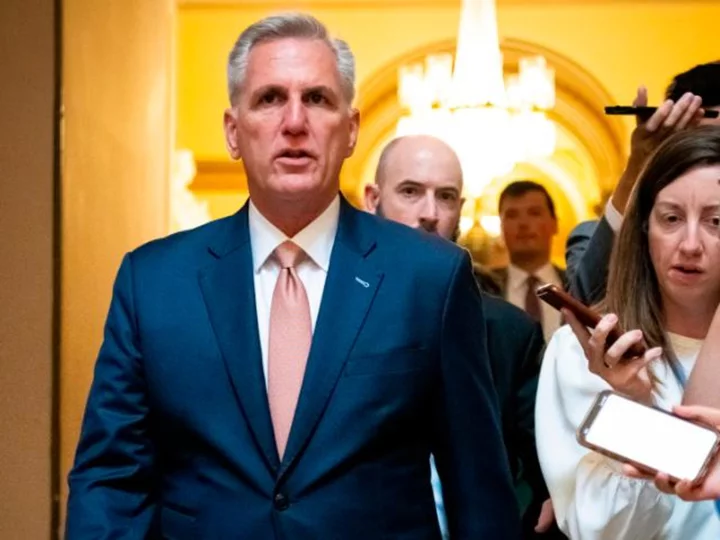Former President Donald Trump falsely claimed Wednesday that polls show his support among Black Americans has quadrupled or quintupled since his mug shot was released.
The booking photo was taken on August 24, when Trump was arrested in Fulton County, Georgia, on charges connected to his efforts to overturn his defeat in the state in the 2020 election.
On Wednesday, Trump claimed in a falsehood-filled interview with conservative commentator Hugh Hewitt that "many Democrats" will be voting for him in the 2024 election because they agree with him that the criminal charges against him in four cases are unfair. He then made this assertion: "The Black community is so different for me in the last -- since that mug shot was taken, I don't know if you've seen the polls; my polls with the Black community have gone up four and five times."
Facts First: National public polls do not show anything close to an increase of "four and five times" in Black support for Trump since his mug shot was taken, either in a race against President Joe Biden or in his own favorability rating; Trump's campaign did not respond to CNN's request to identify any poll that corroborates Trump's claim. Most polls conducted after the release of the mug shot did find a higher level of Black support for Trump than he had in previous polls -- but the increases were within the polls' margins of error, not massive spikes, so it's not clear whether there was a genuine improvement or the bump was just statistical noise. In addition, one poll found a decline in Trump's strength with Black voters in a race against Biden, while another found a decline in his favorability with Black respondents even as he improved in a race against Biden.
Because Black adults make up a relatively small share of the overall population, they tend to have small sample sizes in national public polls. That means the margins of error for this group are big and the results tend to bounce around from poll to poll. And even if Trump's recent polling improvement captures a real change in voter sentiment, there is no evidence that change has anything to do with his mug shot, which no poll asked about; it could just as well have to do with, say, the summer increase in the price of gas or any of numerous other factors affecting perceptions of Biden.
Regardless, Trump greatly exaggerated the size of the recent uptick seen in some polls. Here's a look at what polls actually show about his recent standing with the Black population, plus a fact check of three of Trump's many other false claims from the Hewitt interview.
What the polls show
CNN identified five national public polls that: 1) included data on Black respondents in particular; 2) were conducted after Trump's mug shot was released on August 24; 3) were conducted by pollsters who had also released polls in the recent past.
Four of the polls showed gains for Trump among Black respondents, though much smaller gains than the quadrupling or quintupling he claimed to Hewitt.
Trump gained 3 percentage points with Black respondents in polling by The Economist and YouGov, though within the margin of error -- going from 17% against Biden in mid-August to 20% in late August. (The earlier poll asked the Trump-versus-Biden question of Black adults regardless of whether they are registered to vote, while the later poll asked the question to Black registered voters, so the results might not be directly comparable.) At the same time, Trump's favorability with Black respondents was down 9 percentage points to 18%.
Trump gained 3 percentage points with Black registered voters between a Messenger/Harris X poll in early July and a survey by the same pollster in late August, edging up from 22% against Biden to 25%. Trump gained 6 percentage points among Black adults in polling by the firm Premise, going from 12% against Biden in an Aug. 17-21 poll to 18% in an Aug. 30-Sept. 5 poll. He gained 8 percentage points among Black registered voters in polling by Republican firm Echelon Insights, going from 14% against Biden in late July to 22% in late August. Based on the sample sizes reported for Black respondents in each poll, all of those changes are within the margin of error.
One of the five polls, by Emerson College, showed Trump's standing with Black registered voters worsening after the mug shot was released, though this change was also within the margin of error. In Emerson's mid-August poll, Trump had about 27% Black support in a race against Biden; in its late-August poll, he had about 19% support.
In addition to looking at those five polls, we contacted The Wall Street Journal about an Aug. 24-30 poll, conducted jointly by Republican and Democratic pollsters, for which the newspaper has not yet released detailed demographic-by-demographic results. Aaron Zitner, a Journal reporter and editor who works on the poll, told us that Trump's level of support with Black voters "didn't change at all" between the paper's April poll and this new poll, though Biden's standing declined slightly within the margin of error.
Exit polls estimated that Trump received 12% of the Black vote in the 2020 election. A post-election Pew Research Center analysis found that he received 8%.
Mike Pence's standing in 2016
Trump made another false polling-related claim to Hewitt.
This one was about how Mike Pence, Trump's former vice president and his current opponent for the Republican nomination, had performed in polls during his 2016 campaign for reelection as governor of Indiana. Pence ceased his Indiana campaign when Trump selected him as his running mate in July 2016.
Trump said Wednesday: "I'm disappointed in Mike Pence, because I took Mike from the garbage heap. He was going to lose. You know, he was running for governor, reelection. He was running for governor again, to continue his term, and he was absolutely, you know -- he was down by 10 or 15 points."
Facts First: Trump's claim that Pence was trailing by "10 or 15 points" in his 2016 race is false. It's true that Pence had faced a tough battle for reelection as governor before he ended the campaign to run nationally with Trump, but no public poll had shown him down big.
A May 2016 poll (commissioned by a Republican group that was founded by an opponent of Pence's right-wing stance on gay rights and other issues) had showed Pence with 40% support and his Democratic opponent, John Gregg, with 36% support; the Indianapolis Star called this a "virtual dead heat" because of the poll's margin of error of plus or minus 4 percentage points, but nonetheless, Pence certainly wasn't "down by 10 or 15 points" like Trump said. An April 2016 poll had showed Pence with 49% support to Gregg's 45%, again within the margin of error but not with Pence trailing.
"There would not be any poll that would show Pence down 10-15 points to John Gregg at that time or frankly at any point even if Pence had stayed for the reelection campaign," Christine Matthews, the president of Bellwether Research & Consulting and a Republican pollster who conducted surveys during that 2016 race in Indiana, including the May 2016 poll mentioned above, told CNN on Wednesday. Matthews said Pence could possibly have lost the race if he had remained in it, "but no poll would have shown him down by 10-15 points in that process."
Alabama, Georgia and South Carolina in 2020
Trump repeated his usual lies about the 2020 election -- saying, among other things, that "it was rigged and stolen." In support of those lies, he said: "One of the top people in Alabama said you don't win Alabama by 45 points or whatever it is I won, and then win South Carolina in a record, nobody's ever gotten that many votes, and then you lose Georgia by just a couple of votes. It doesn't work that way."
Facts First: Trump hedged his claim that he won Alabama by "45 points," adding the "whatever it is I won," but the "45 points" claim is not even close to correct no matter what "one of the top people" told him; he won Alabama by about 25.5 percentage points in 2020. He lost Georgia by far more than "just a couple of votes"; it was 11,779 votes. And while he did earn a record number of votes in South Carolina, he did not win the state with anything close to a "record" margin of victory; his roughly 11.7-point margin in 2020 was about 2.6 points smaller than his own margin in 2016 and also smaller than the margins earned by numerous previous winners.
In addition, Trump's claim that "it doesn't work that way" -- winning some states big while losing a nearby state -- is also baseless. Even neighboring states are not the same. Georgia, which Trump lost fair and square, has key demographic and social differences from South Carolina and Alabama, as we explained in a previous fact check.
The price of bacon
Polls and election results weren't the only things Trump exaggerated about in the interview.
He invoked the price of bacon while criticizing the Biden administration for speaking positively about the state of inflation, which has declined sharply over the last year but remains elevated. "They try and say, 'Oh, inflation's wonderful.' What about for the last three years, where bacon is five times higher than it was just a few years ago?"
Facts First: Trump's claim that the price of bacon has quintupled over the last few years is grossly inaccurate. The average price of bacon is higher than it was three years ago, but it is nowhere near "five times higher." The average price for a pound of sliced bacon was $6.236 per pound in July 2023, up from $5.776 in July 2020, according to federal data -- an increase of about 8%, nowhere near the 400% increase Trump claimed.
You can come up with a larger percentage increase if you start the clock at a different point in 2020; for example, the July 2023 average price is a 13.4% increase from the February 2020 average price. But even that larger increase is way smaller than Trump claimed.









